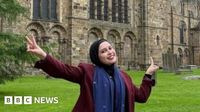For 29-year-old Sana el-Azab, the journey from Deir al-Balah in Gaza to the historic city of Durham in northeast England was more than a change of scenery—it was a leap across worlds. “It’s another planet, not just another world,” Sana reflected after arriving late last month, evacuated with 33 other students from the war-torn enclave. Her story, echoed by dozens of Gazan students now scattered across British universities, is a testament to resilience, hope, and the relentless pursuit of education amid devastation.
Sana, a former teacher, was awarded a scholarship to study educational leadership and change at Durham University in June 2025. Yet, her path to the UK was anything but straightforward. Weeks of uncertainty followed the scholarship offer, as British politicians and academics lobbied for her and other Gazan students with fully-funded places to be granted entry. The breakthrough finally came in the dead of night on September 17, when Sana left her home for Jordan to complete biometric tests, before boarding a plane bound for Durham. “The big moment that I’d been waiting for finally arrived,” she recalled, her voice tinged with relief and disbelief.
Leaving Gaza was a bittersweet victory. “No one can understand what I lived through in Gaza,” Sana told BBC News. The education system she once knew has been obliterated. “There’s no chance to continue your higher education in Gaza. All the universities are destroyed. There’s no education system at all anymore.” The main campus of Al-Azhar University, where Sana earned her BA in English literature, now lies in ruins, a casualty of Israeli bombardment and controlled demolitions. According to a June 2025 report by a UN independent international commission of inquiry, Israel had “obliterated Gaza’s education system.”
The statistics paint a grim picture. For two years, formal face-to-face education in Gaza has been suspended. Ninety-seven percent of schools have sustained damage, according to the Global Education Cluster—a partnership of UN agencies and NGOs—and many were directly struck by airstrikes targeting Hamas and other armed groups. Nearly 660,000 children remain out of school, and about 87,000 university students have had their academic lives upended. Schools, once safe havens, have become shelters for displaced families, further eroding any semblance of normalcy for Gaza’s youth. The UN warns of a “lost generation.”
For Sana, the tragedy is deeply personal. “My six-year-old niece asked me what it’s like to be in school,” she shared. “She doesn’t know. Imagine what they’ve all missed out on. This is now the third year.” Unwilling to let the children around her languish in despair, Sana took matters into her own hands. In April 2024, she established a makeshift school in a roofless building at her home in Deir al-Balah. Twenty girls, aged seven to twelve, attended regularly. Sometimes, the number swelled to fifty. “I saw displaced children just spending their time in queues for food and water—not having a childhood, and I wanted to do something, for them,” she said. “There were drones overhead 24 hours and bombing around us.”
Despite the dangers, the children were eager to learn. Sana started with English lessons, then added math at the girls’ request. She introduced weekly art classes to help them process their trauma. “No parent had time to talk to their children about their feelings,” Sana explained. The makeshift curriculum also included “survival skills”—like filtering water with charcoal to make it safer to use. A simple daily meal was provided, because as Sana put it, “It’s not easy to teach hungry kids.”
Leaving behind her students and family was an agonizing decision. “I left with just my mobile phone and the clothes I was wearing—that’s all I was allowed to take,” she said. “I’m so proud that I made it here. But it’s very complicated. I can’t process everything. It’s overwhelming. I’m relieved and grateful and happy that I got out but I feel sorrow at leaving behind my precious siblings, and nieces and nephews, and elderly parents in that dire situation.”
Sana is not alone in her journey. In total, 58 students from Gaza have now arrived in the UK to take up scholarships at more than 30 universities, with 34 arriving in late September and another 24 the following week. Twenty more remain in Gaza, waiting for their chance. “It’s been a relentless and very, very difficult process, when it should have been much easier,” said Nora Parr, an academic and researcher at Birmingham University who coordinated the educational evacuations. “These are the people who are going to rebuild Gaza. They want to do everyone proud and learn as much as they can. I wish they could have come a week or two before their courses started to help them settle in. But I hope this is an opportunity that can be built on because the needs are massive.”
The UK Foreign Office described the evacuation as a “highly complex process,” with more students expected to arrive in the coming weeks. The challenges facing these students are not just logistical. For Sana, adapting to life in Durham has been both a relief and a struggle. “It’s hard to go from survival mode to learning. Half of my mind is in class and the other half is still in Gaza,” she admitted. Walking through Durham’s picturesque streets feels like therapy, a world away from the chaos she left behind. Yet, the trauma lingers. Her first trip to a supermarket left her transfixed in the bread aisle, overwhelmed by abundance. She still battles insomnia and loss of appetite, the scars of conflict etched deep.
Education has always been a sanctuary for Sana, a bridge to a better future. Now, she’s determined to seize every opportunity her scholarship provides. “And then I want to go back to Gaza and bring the change,” she said, her resolve undiminished by distance or hardship.
As the new academic year unfolds, the stories of Sana and her peers serve as a stark reminder of the cost of war—and the power of education to heal, inspire, and rebuild. Their presence in UK universities is more than a personal triumph; it’s a beacon of hope for a generation that refuses to be lost.




